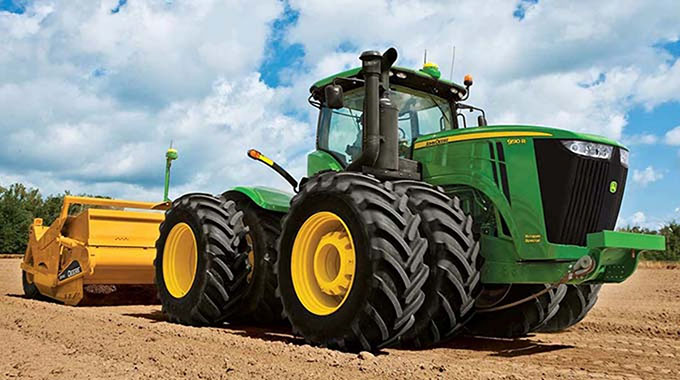
Agricultural mechanisation has emerged as a top priority for the Government as it works round the clock to revitalise the sector, obtain self-sufficiency in food supplies and boost exports.
Mechanisation boosts productivity in commercial and smallholder farming sectors and increases the value added for investment in inputs and labour.
The Government’s farm mechanisation programme can play a key role in tapping underused agricultural potential, especially where access to labour, rather than land remains a stumbling block for farmers.
Furthermore, it can also reduce the burden of heavy physical work, low output and address concerns over crop quality.
Reports that tractors, along with combine harvesters and other equipment were being distributed countrywide are encouraging.
In many ways, it affirms the Government’s audacious attempt to mechanise and modernise the agricultural sector which reportedly has a shortage of over 30 000 tractors.
The latest delivery was courtesy of a deal with John Deere, the world’s largest manufacturer of agricultural equipment.
Under a US$51 million facility, Zimbabwe is expected to receive 1 300 tractors, 80 combine harvesters and other vital agricultural equipment, which will be offered to farmers under a new model for equipment sourcing.
Ever since the Fast-track Land Reform Programme started in the early 2000s, farm mechanisation efforts have encountered numerous problems that include financial challenges, corruption and poor repayment of loans.
The President is working to overcome these challenges by promoting smart partnerships between the public and private sectors in a win-win arrangement.
Under the deal, facilitated by local distributor AFGRI, which has trained Government staff and regional engineers on the equipment, up to 5 000 farmers are set to benefit through loan arrangements with local banks which require a 20 percent down payment and repayment over three to five years with a low interest rate of up to 8 percent.
To demonstrate the Government’s commitment, the machinery was secured with the Government as the main guarantor through various mechanisation deals signed with manufacturers.
President Mnangagwa is endowed with vital experience when it comes to avoiding mistakes that were made under the previous administration in terms of the handling of agricultural mechanisation programmes.
In an attempt to enhance transparency and accountability, the responsibility for assessing creditworthiness and loans issuance for the John Deere equipment will be with two local banks and one foreign-owned bank, following the sort of rules banks apply when they lend money.
So borrowers have to show commitment, ability to generate income from the loan and so be able to pay it back. Banks are not charities.
This was done in the hope of improving repayment transparency and efficiency.
All this, instils a sense of confidence among farmers keen to build their mechanisation capacity and boost their yields. Government is making steady progress to invest in irrigation equipment to boost productivity right across the country.
The UN’s Food and Agriculture Organisation says Africa has less than two tractors per 1 000 hectares of cropland compared to 10 tractors per 1 000 hectares in South Asia and Latin America, both areas usually counted as being in the developing world, but both starting to race ahead of Africa.
Under the African Union’s 2014 Malabo Declaration, African Union member states explicitly committed themselves to making investments in “suitable, reliable, and affordable mechanisation and energy supplies” in order to double productivity by 2025. With sustained mechanisation efforts, Zimbabwe is on course to attaining some of the goals set under the AU and the UN.
However, there are small housekeeping issues that regularly pop and jeopardise State-led farm mechanisation programmes.
Over the past decades, State-led and donor-backed mechanisation efforts encountered numerous challenges-related to distribution, maintenance and loan repayment.
For example, it was common for a group of farmers sharing equipment to disagree on who could use machinery first.
Such disputes were often most heated for farm operations that led to high yield drops and unnecessary crop losses.
In addition, wealthy and powerful farmers often dominated the acquisition of machinery with smallholders having less of a voice.
This created discord and affected farm productivity.
Once a combine harvester is dispatched to a particular group of farmers in a particular province, it is important these small housekeeping issues are handled well.
The less powerful and less influential farmers are often disadvantaged and all this needs to be addressed fully as such discord have led to late harvesting of the winter wheat.
Given these challenges, we welcome moves to involve private actors in the management of the country’s farm mechanisation programme.
Zimbabwe’s mechanisation model, which is embracing both state and market-led initiatives, needs a supportive environment to thrive, especially regarding knowledge and skills development. Most farmers regularly face long machinery breakdowns due to a lack of knowledge on adequate machine operation and maintenance.
The Government and its private sector partners should play their part here by stepping in and training operators and technicians.
Training is quite critical for the survival of the country’s farm mechanisation programme. Furthermore, mechanisation comes with opportunities for value addition even at farm level. It is encouraging that some farmers are now buying machinery to make pellet feed as they diversify operations to include stock-feed production.
This helps farmers to increase profit margins and cut costs through mechanisation of other farm activities.
The sharp edges of the mechanisation sword remain transparency, accountability, good management, training, machinery servicing and accessibility for the majority of farmers.
With all this, it becomes possible for Zimbabwe to undergo a genuine agricultural revolution where farming is seen as a profitable business for those prepared to acquire skills and work hard, just as they need to do in any other business.
This should also make farming more attractive to the youths.
Agricultural mechanisation is key to the transforming of our agricultural sector and all have a role to play for its success.
